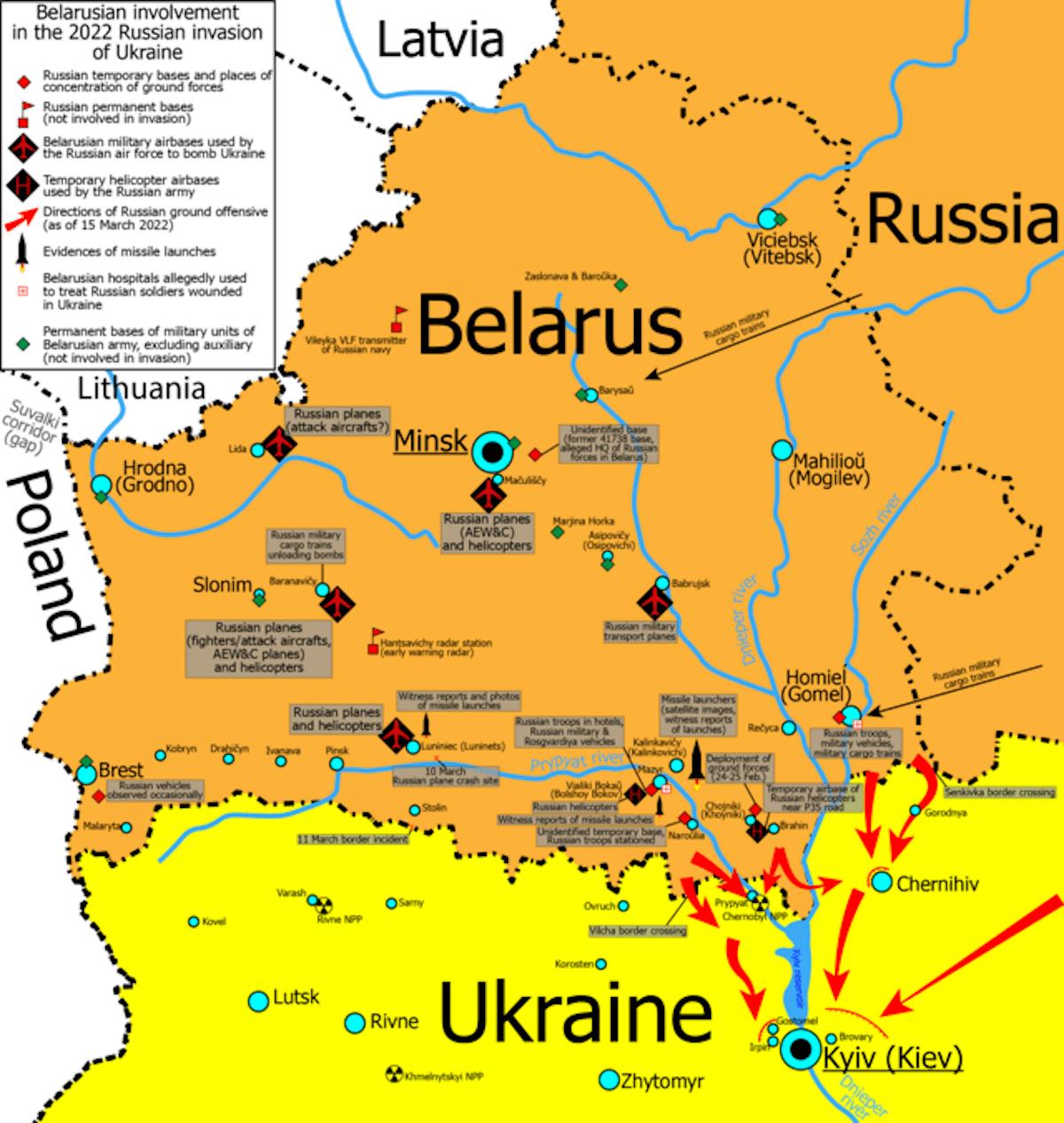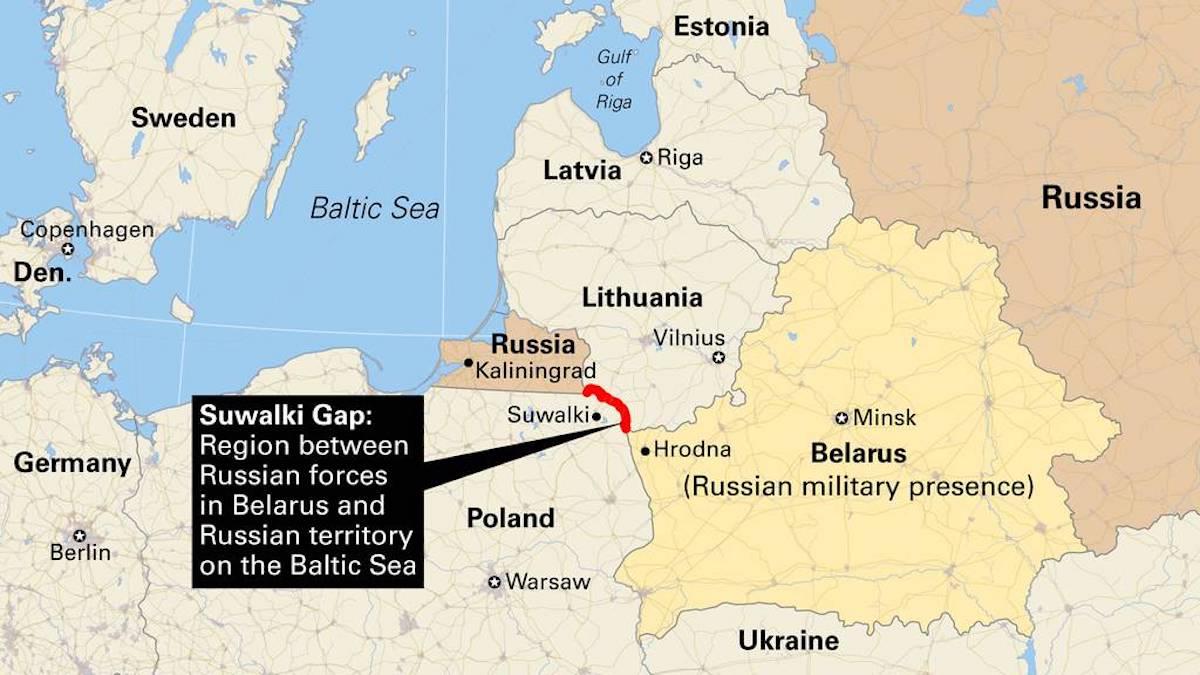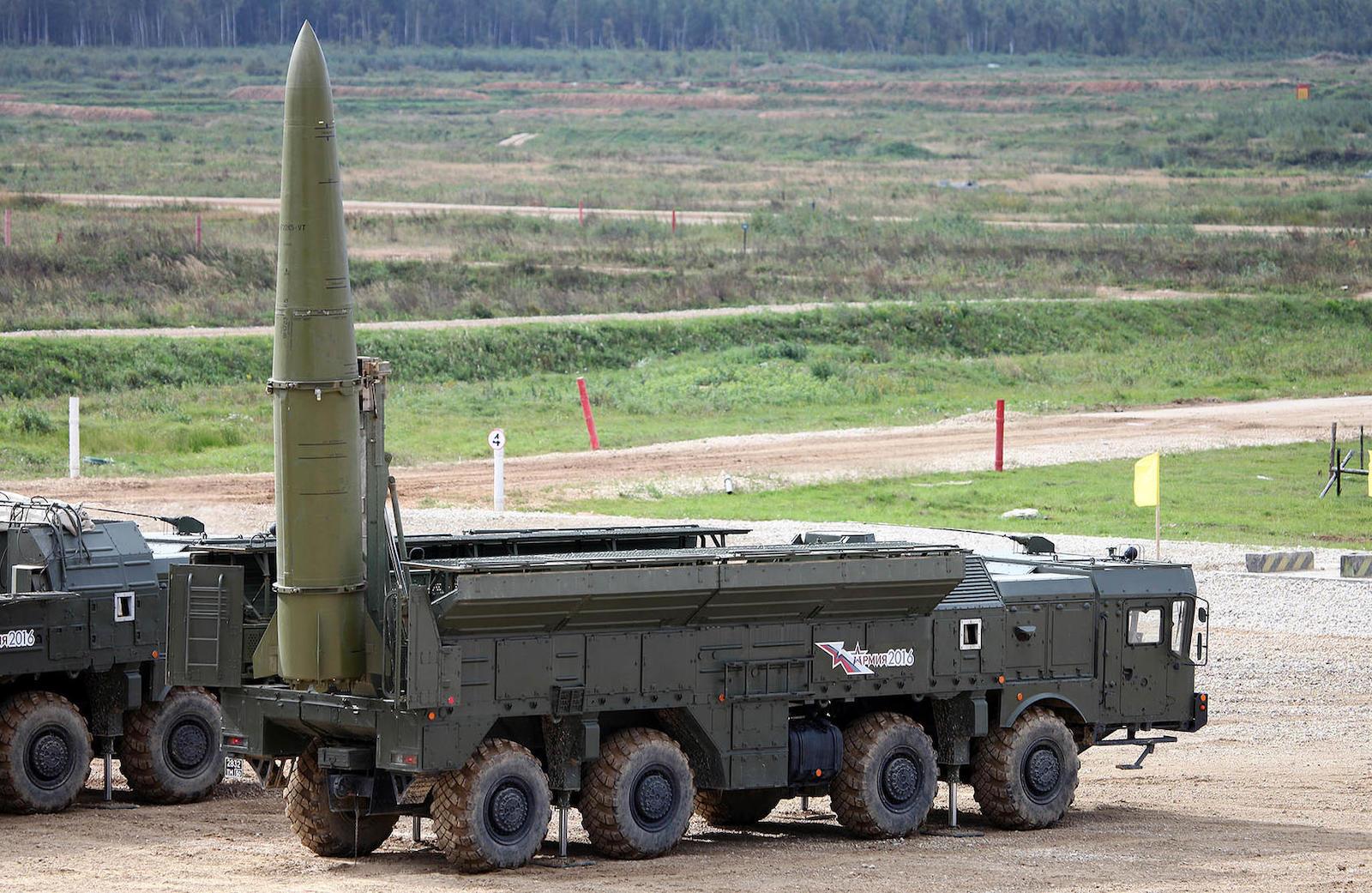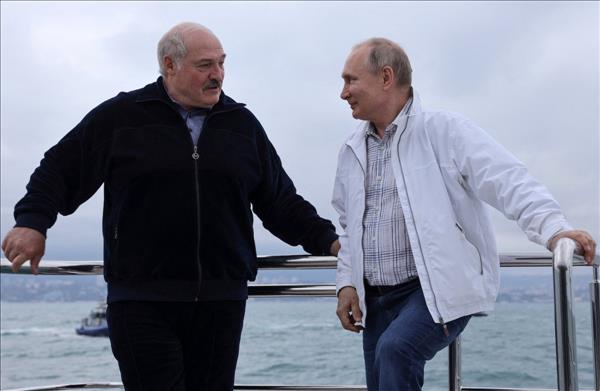
How A Belarus Invasion Could Turn The Ukraine War
The government of Belarus, which during the past three years has moved politically ever closer to Russia, is under pressure from Moscow to deepen its involvement in the Russian war on Ukraine.
At issue is whether Belarus's President-for-life Alexander Lukashenko will let Moscow's armed forces launch from his country an assault on Kiev, Ukraine's capital.
Russian President Vladimir Putin wants to overrun the city. A drive on it would be part of a broader effort to take Ukrainian territory, some of which Russia won and then lost early in the war.
This month, Russia and Belarus began joint air and ground maneuvers, which are scheduled to end in early February. Ukrainian officials expect a major Russian offensive sometime thereafter.
Russian Defense Minister Sergei Shoigu spoke with his Belarusian counterpart, Viktor Khrenin, by phone and Russian military officials are reportedly holding continuing talks in Belarus to work out conditions for using the country as a launching pad.
Belarusian officials reported vaguely that the pair discussed“progress in preparing” future permanent military cooperation. Last year, as the invasion got underway, Lukashenko permitted Russia to launch missiles into Ukraine from Belarusian territory and let some units invade on the ground.

Belarusian involvement in the 2022 invasion of Ukraine. Map: Wikimedia
He is resisting pressure from Putin to go beyond that and allow a large force of Russian troops to assault Kiev, which lies close to the border with Belarus. Ukrainian officials are convinced Russian troops will eventually invade from Belarus.
Colonel Oleh Zhdanov, a former operations officer in the Ukrainian Armed Forces, told reporters in Kiev that the Russians will make a “pincer attack” on the capital from the east and south. Ukraine is“watching Russian military constantly moving 10,000-12,000 men in Belarus,” he said.
Rustem Umerov, a Ukrainian legislator, added,“Russians are encircling us from 240 degrees, attacking from the Black Sea, from Belarus and the Luhansk and Donetsk regions” which lie to the east.
Russian troops arrived in Belarus last October. Their continuing presence has raised questions – and not only about their possible role in attacking Ukraine. Beyond that, they will probably stay on and present a new threat to the eastern flank of the North Atlantic Treaty Organization.
Depending on where Russia places the troops and on their number and weaponry, they could menace NATO's three Baltic Sea states – Latvia, Lithuania and Estonia. On Polish territory adjoining the Lithuanian border is the suwalki corridor also called the Suwalki Gap, a land passage connecting the isolated Russian region of Kaliningrad on the Baltic Sea and Belarus.
“Such a move could dramatically increase the challenge NATO faces defending the Baltic States from future Russian attack,” asserted a report issued last December by the Institute for the Study of War, a Washington-based think tank. It would put Russian mechanized units on both ends of the narrow Suwalki Corridor, across which“NATO supplies and reinforcements to the Baltic States” must pass.

Map: Twitter / Defense News
Lukashenko, rather than playing a second-fiddle ally of Putin's, once featured as a statesman whose mission was to ease East-West tensions. In 2014 and 2015, he hosted peace talks in Minsk, the Belarusian capital, designed to end fighting between the Ukrainian government and separatists supported by Russia.
In 2020-21, Lukashenko battled mass anti-government protests at home, first against his decision to seek a sixth five-year presidential term and then on suspicions that the subsequent election was rigged.
Western governments imposed economic sanctions for“continuing attacks on human rights, fundamental freedoms, and international law,” according to a 2021 joint statement by the United States, United Kingdom, Canada and the European Union.
Lukashenko turned to Russia for succor. Putin responded with a promise to provide military help“if necessary.” Emboldened, Lukashenko jailed thousands of demonstrators and shut down the independent press and human rights organizations.
The political bill for this support is coming due. At Putin's request, Lukashenko has permitted 11,000 Russian troops, already encamped at two Belarusian military bases, to hold joint military maneuvers with Belarusian units.
He has also gone out of his way to praise Putin, whom he called his“older brother” and thanked Russia for having“held out its hand to us” by providing Belarus with oil and gas at discounted prices.
“Russia can manage without us, but we can't without Russia,” he said.
What might Putin eventually want from Lukashenko and Belarus? At least a staging area to host troops invading Ukraine, military observers say. One potential starting position for an assault on Kyiv would be eastern Belarus, closest to Kiev. But the area is swampy and contains no adequate military facilities where the Russians could encamp. They would have to build one.
Two other areas could serve as invasion platforms, one in central Belarus, out of range of Ukrainian artillery, and another at the frontier with Poland. Besides providing a site for invading Belarus, either would also create a new unwelcome reality for NATO: a Russian front facing Poland and the Baltic states near the Suwalki Corridor.
“NATO would have to think hard and fast about how to secure its ground line of communication through the corridor in such a scenario,” wrote ISW.
Lukashenko faces an existential geopolitical dilemma. Will his country continue to exist as an independent state after the Ukraine war ends?
“The absorption of Belarus into Russia seems inevitable if Russia is able to get its way in Ukraine,” predicted Samantha de Bandern, a French journalist and fellow at Chatham House, a British political analysis group.
Belarus has fallen into an“alliance trap” in which it may be unable to control its own future no matter if Russia wins or loses the war, said Anais Marin, another Chatham House fellow.
Ryhor Astapenia, who heads an analysis team on Belarus at Chatham House, laid out a series of scenarios, most of which spell doom for Belarusian independence:
- Russia wins in Ukraine, and Belarus is swallowed up by a victorious“big brother”;
- Ukraine triumphs, Russia retreats from efforts to restore some semblance of the former-Soviet Union and Belarus can try to make amends with the outside world; or
- A defeated Russia angrily annexes Belarus as a kind of consolation prize.
“When we hear that Ukraine is in [Putin's] sphere of influence – that he wants it to be - Belarus is as well; he cannot let it go,” says Tatsiana Kulakevich, a political scientist at the University of South Florida.“And it's a very unfortunate situation because the Belarusian people cannot do anything.”
Military analysts are also fretting that Putin might launch nuclear bombs from Belarus into Ukraine.

A Russian dual-capable missile, the Iskander-M. Photo: Wikimedia Commons
“Once Russia becomes primarily a conventional threat that has to operate mainly on the conventional plane it must confront its almost insurmountable economic and demographic disadvantages,” wrote Frederick Kagan, a top ISW analyst. Among the options available to“mitigate” that outcome, Kagan said, would be to use nuclear weapons.
Under this scenario, Putin would hope to avoid retaliation aimed at the Russian homeland by launching a nuclear bomb from Belarus and letting Minsk suffer the consequences.
That may seem far-fetched but consider Western thinking during the Cold War. The allies considered what action to take if Moscow used a Warsaw Pact country as a launching pad to fire a nuclear-armed missile into Western Europe. The consensus was reached to strike back within the Warsaw Pact.
Lukashenko has publicly vetoed only one possible Russian military activity on Belarusian territory: the transfer to and use of nuclear weapons in the country. In a May interview with the Associated Press, he said such actions were“unacceptable.”

Legal Disclaimer:
MENAFN provides the information “as is” without warranty of any kind. We do not accept any responsibility or liability for the accuracy, content, images, videos, licenses, completeness, legality, or reliability of the information contained in this article. If you have any complaints or copyright issues related to this article, kindly contact the provider above.






















Comments
No comment